By Logan Michael
Kids’ movies are often written off as overly simplistic pieces of media that only serve to churn a profit.
Considering the seemingly annual, overly saturated, over-advertised, and unbearably inescapable nature of the colorful kids’ movie trailer, I can’t exactly blame people for their low expectations and seasonal annoyance.
It seems that every Christmas there’s a dozen or so mediocre movies designed to draw parents and their screaming rug rats to theatres, just so that they can be subjected to movie-related merchandise for the remainder of the holiday quarter.
This isn’t to say that kids’ movies are bad, per se; many movies overtly marketed to children like The Lego Movie and Inside Out have received critical acclaim for their exploration of complex themes, confidently soaring over the heads of children. Topics like the philosophical pitfalls of individualism and collectivism, or the tendency to suppress, rather than accept our emotions are placed in these particularly exceptional films primarily to resonate with a secondary (yet necessary) adult audience.
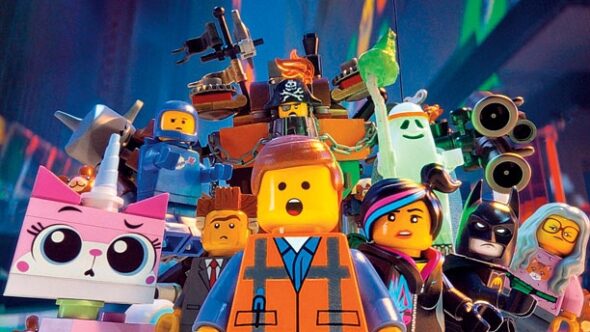
I didn’t expect Transformers One to join the ranks of these aforementioned masterpieces. Transformers One, to my surprise, exhibited complex themes of conflicting political ideology and revolution through a creative use of dialogue– by no means did I anticipate this. I expected Transformers One to be a seasonal, flashy, action-packed screen-occupier, only existing to sell Hasbro’s adjacent Transformers One toy line. The original Transformers television show back in 1984 existed for this purpose, as did the 21st century’s explosion-ridden Michael Bay films. Transformers One, I thought, should have been the same.
The film follows the previously overshadowed origin story of Optimus Prime and Megatron, before their respective roles as leaders of the Autobots and Decepticons, serving as a long-overdue prequel for much of Transformers media.
These two pop culture-powerhouses appear significantly different than their previous cinematic appearances. What is typically portrayed as a power-matched historic vendetta between the leaders of two warring factions, is instead revealed to be a brotherly bond gone wrong, eventually transforming into the brutal rivalry we know and love.
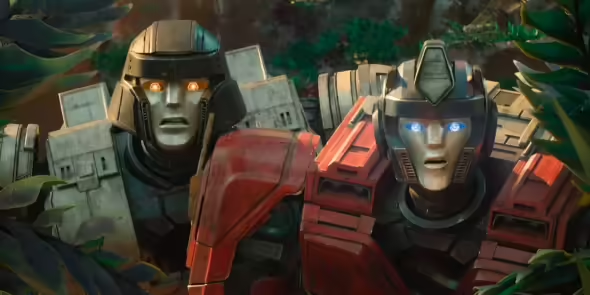
Much of the movie is well spent painting the world these two inhabit.
We quickly learn that Cybertron (the home planet of the Transformers) and its society of robots is split into a pseudo-caste system. Those with transformation-cogs lodged inside their chests, and those without.
Robots without these important cogs were subjected to laborious tasks like mining, whereas those who had them enjoyed personal freedom in both occupation and bodily transformation.
Early in the movie, Optimus Prime barks insults at a mine supervisor for, in his eyes, wrongfully firing his superior for a mistake that was his own. In response, both Optimus Prime and Megatron are slugged by the larger metallic manager for insubordination.
After they’d both recovered, Megatron remarks,
“you know you were out of line, talking to a superior like that…” to which Optimus retorts,
“Aren’t you tired of being treated like we’re nothing?” only for Megatron to affirm the manager’s actions, stating,
“he had every right to hit me—I interfered.”
In this simple exchange of dialogue, we see Optimus Prime being willing to challenge authority if he believes injustice be present, whereas Megatron simply retains an unwavering respect for those above him, even blaming himself for merely talking to the abusive supervisor.
This distinct difference between the two is the start of the film’s increasingly heavy ideological subtext.
Well into their adventure, the two discover that Sentinel Prime (the faux leader of the planet) had been lying to the people of Cybertron; Sentinel Prime was selling off the resources mined tirelessly by the lower class to the Quintessons: a colonial alien race secretly ruling Cybertron, all so Sentinel could ‘live like a king.’
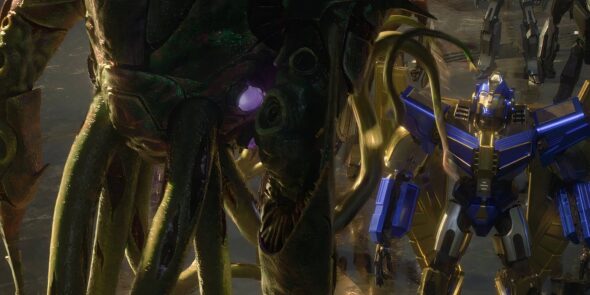
The role of Sentinel Prime, a native Cybertronian bargaining with an outside colonial force at the expense of his own people, largely echoes the real-world colonialism of India by the British Crown.
From 1858-1947 Great Britian ruled over the Indian sub-continent primarily though merciless direct rule. Some areas of India, however, were allowed a higher degree of governmental autonomy. These areas were known as ‘princely states’ and were ruled by local Indian executives.
Even though these areas were ruled by Indians instead of the British, these rulers were still subject to the British Crown. If they interfered with the policy of the British monarch, they could risk annexation, losing the small drop of sovereignty they still have.
I’m sure you see where I’m going with this—the dynamic between Sentinel Prime, who’s effectively Cybertronian royalty, and the Quintessons, an outside alien influence pillaging Cybertron for its Energon, functions as an oddly strong metaphor for real world colonialism; and with colonialism comes an independence movement, and with an independence movement comes political ideology.
Upon discovering Sentinel’s betrayal of Cybertron, Optimus and Megatron had drastically different reactions, culminating in a heated argument exposing their ideological divide.
Optimus: “Sentinel Prime has been forcing us to stay in the mines until our gears shift, and all the while he’s been giving the energon away to our greatest enemies… don’t you want to stop him?”
Megatron: “NO I WANT TO KILL HIM… I WANT TO PUT SENTINAL IN CHAINS AND MARCH HIM THROUGH THE MINES SO EVERYONE CAN SEE HIM FOR THE FALSE PRIME THAT HE IS.”
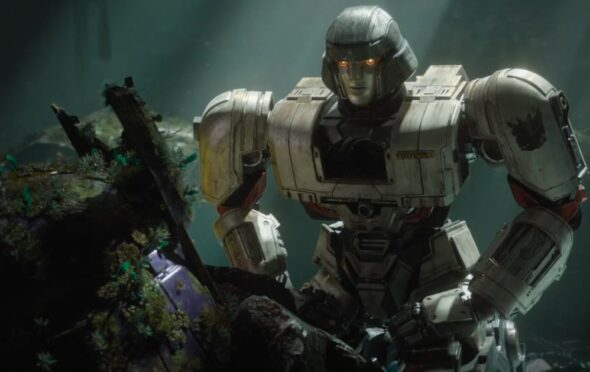
Metal, huh? For a kid’s movie, Transformers One is willing to go frightfully far to establish its themes. Optimus Prime and Megatron both want to act; they both want to change things; they both want to dispose of Sentinel’s unjust rule. Despite this similarity, their motivations couldn’t be more different. Optimus’ motivation for action is to make the world better—after all, that’s why they’re on this journey in the first place. Megatron, on the other hand, simply wants to make Sentinel pay; essentially, Optimus wants to make change out of love for the oppressed—his fellow miner, whereas Megatron wants to make change out of hate for the oppressor—Sentinel Prime, his former idolized leader, that lied to him about everything.
This piece of dialogue is essentially the breaking point between these two robots—cementing their ideological divide. Optimus Prime, out of ambition and care for his fellow man, wants to change the world, restore Cybertron’s Energon flow, and free the workers from their toil. Megatron is merely committed to enacting revenge on Sentinel Prime and replacing him as Cybertron’s ruler, effectively leaving the economic relations of Cybertron unchanged.
This ideological difference is almost completely analogous to the historical struggle and conflict between socialism—a philosophy positing worker liberation and change, and fascism—a movement built on the cultural respect of power and authoritarian rule.
This analogy becomes much clearer in the movies final act—when Optimus Prime and Megatron both recruit their respective armies to carry out the onslaught on Sentinel Prime.
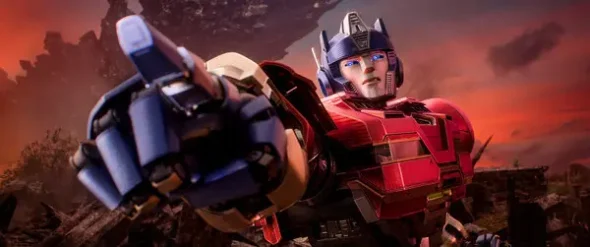
Optimus Prime goes back to his old mining unit to essentially radicalize them; he tells the miners of Sentinel’s betrayal, and inspires them to take back what is rightfully theirs, stating,
“He stole our freedom. But now, I’m offering you your first real choice: you can work a 23rd shift and mine yourself to death, or fight back against sentinel with me!”
Optimus Prime is essentially introducing these miners to a dichotomy rife with dissension: keep working, or fight—the implication being that, frankly, there’s nothing left to lose; Sentinel Prime has already robbed them of their freedom.
This speech is remarkably similar to the popular socialist slogan, ‘Workers of the world, unite! You have nothing to lose but your chains!” which was literally derived from the communist manifesto. No matter your feelings towards socialism in our modern, polarized political climate, the similarities between historical socialist rhetoric, and this line from Optimus freaking Prime is uncanny.
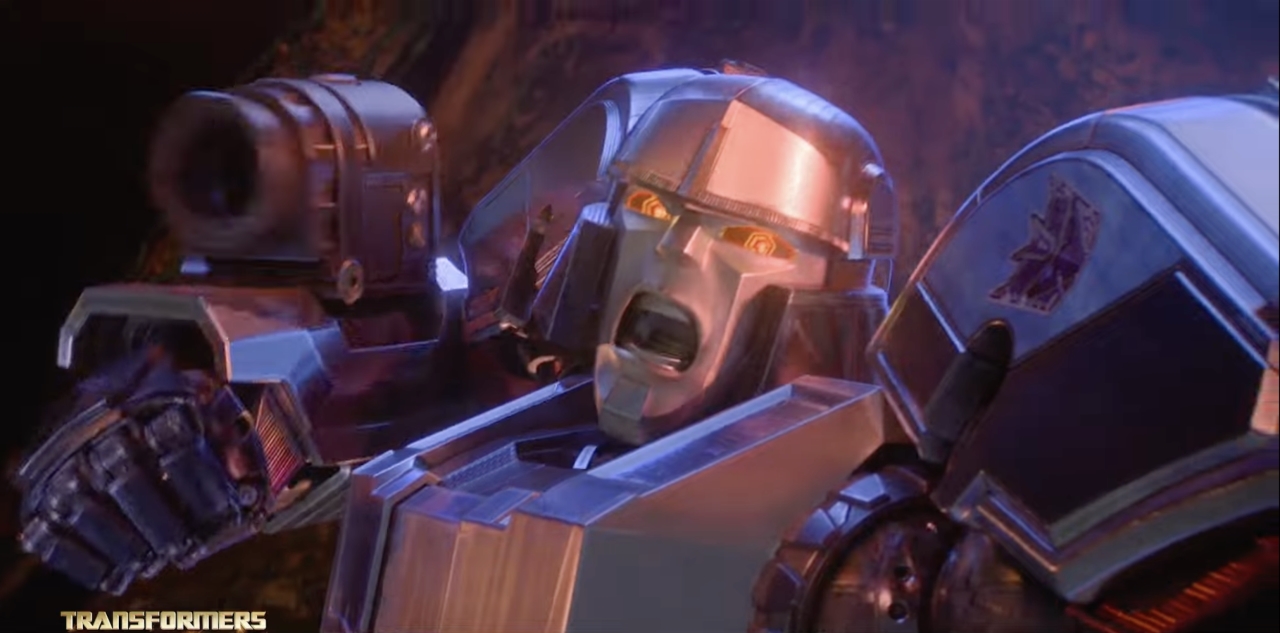
Megatron’s recruitment scheme is also ideologically revealing. In Fascistic fashion, he finds a band of ex-military robots who share similar sentiments as him, that being the impossibility of a unified Cybertron, and the ‘strength of one bot, over another!’
Megatron quickly confronts their leader, defeats him in battle, and assumes control of the mercenaries that would eventually become the Decepticons. Attempting to rally them to his cause, Megatron shouts,
“You can stay here in hiding, bowing before your pathetic leader, or follow me, as we march on Iacon [the capitol of Cybertron], and I take down Sentinel, ONCE AND FOR ALL.”
This rallying call for violence and marching on the capitol is eerily similar to how real historical fascists have taken power. The world’s first fascist leader, Benito Mussolini, gained power by his ‘March on Rome,’ where he capitalized on the public’s fear of a socialist revolution, marched on the capitol, and forced the king to name him Prime minister.
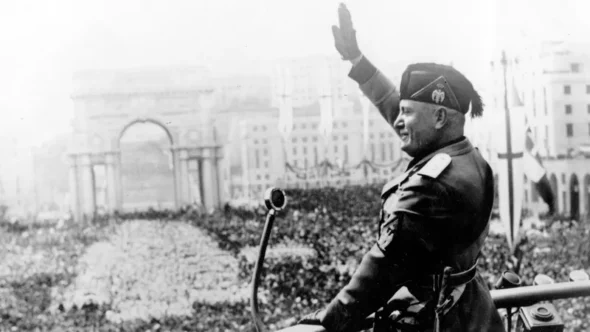
The Megatron-Mussolini similarities don’t end there, however. Megatron’s infatuation with battle as a means of acquiring power echoes the comedic yet historically true reality of Mussolini’s tendency to challenge others to sword duels over editorial disagreements during his time as a newspaper editor. Sometimes reality is just as crazy as the movies we deem fictitious and impossible.
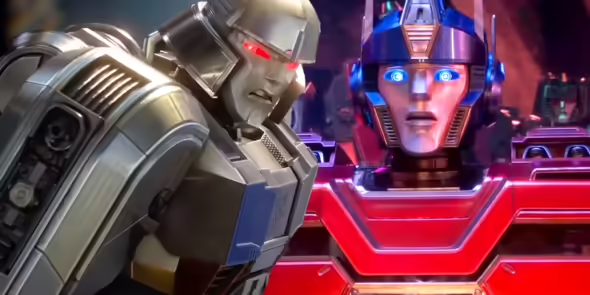
While Transformers One has certainly received critical acclaim from moviegoers, it’s performance at the box office has been mediocre, leaving the prospect of future sequels uneasy at best, despite fans’ hopes.
Regardless of the ambiguous financial success of the film, the complexity of a movie produced for children and made to sell toys is astounding. What was expected to be a simple action drama between characters audiences were already familiar with, ended up being a complex discussion around the severity of ideological differences between otherwise close individuals.
Optimus Prime’s declaration that ‘freedom and autonomy are the rights of all sentient beings’ may seem like a kid-friendly poetic platitude meant to affirm the notion of equality, but when one looks a little deeper, this sci-fi robot is literally defending the idea of inalienable rights. Is this ridiculous? Certainly– but adults seem to keep watching kids’ movies, so ridiculous it will be!

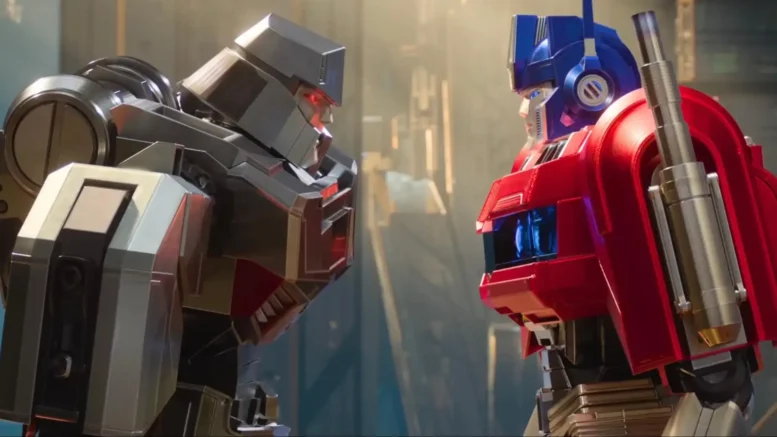


Be the first to comment on "Transformers One: Kids movie, or Political Metaphor?"